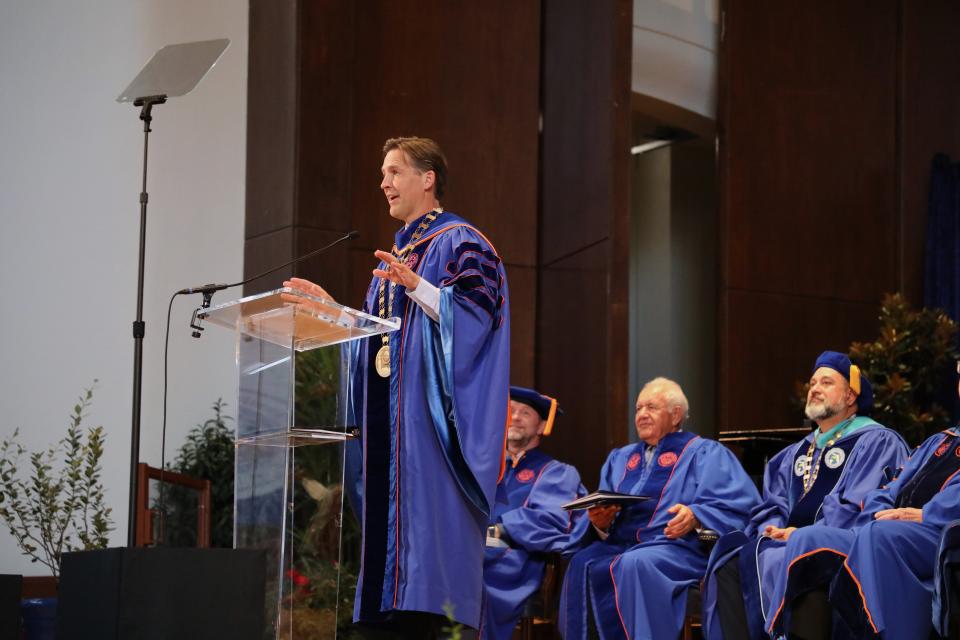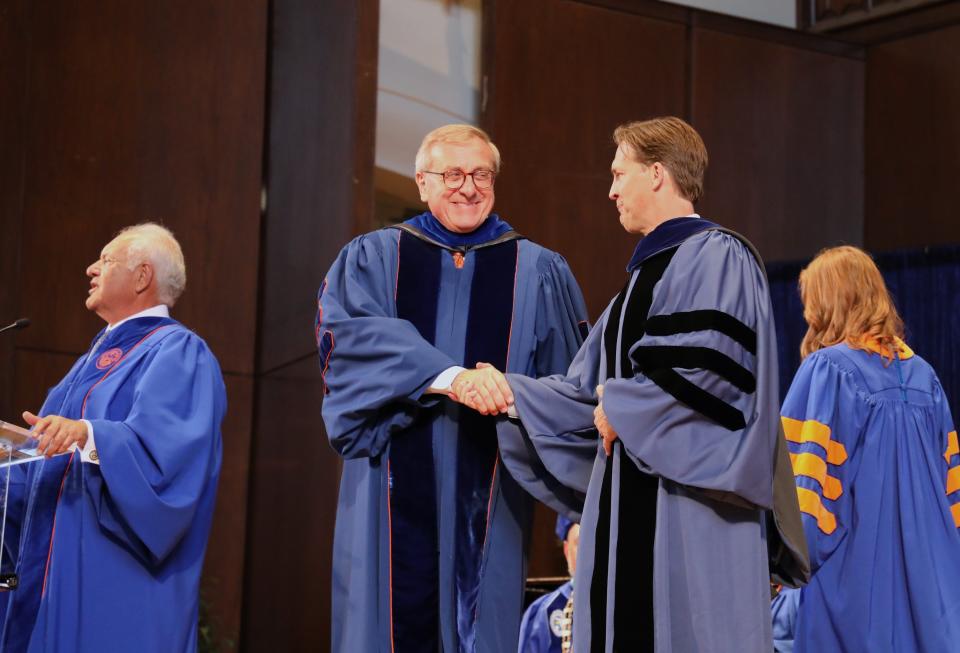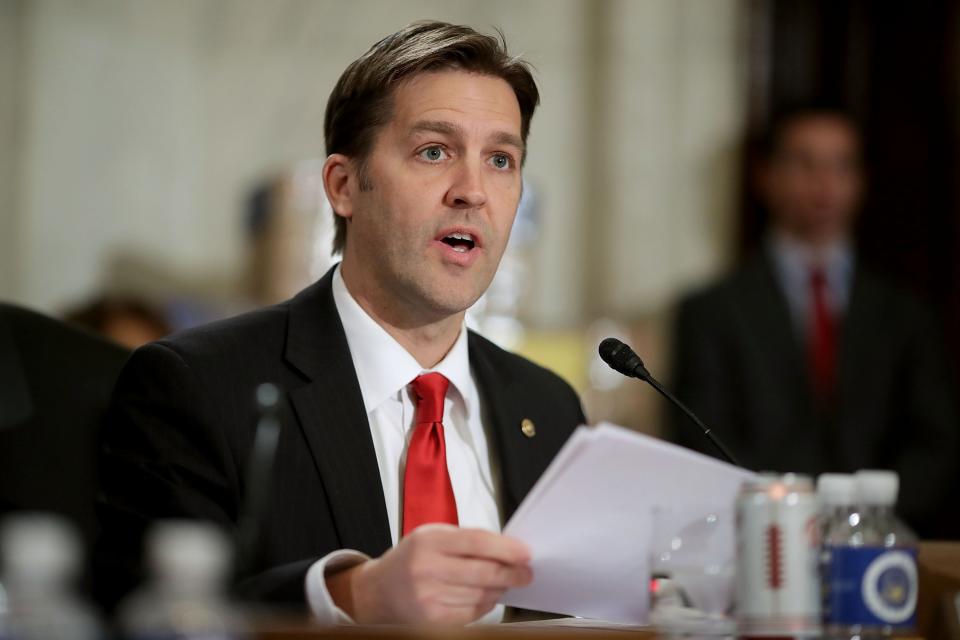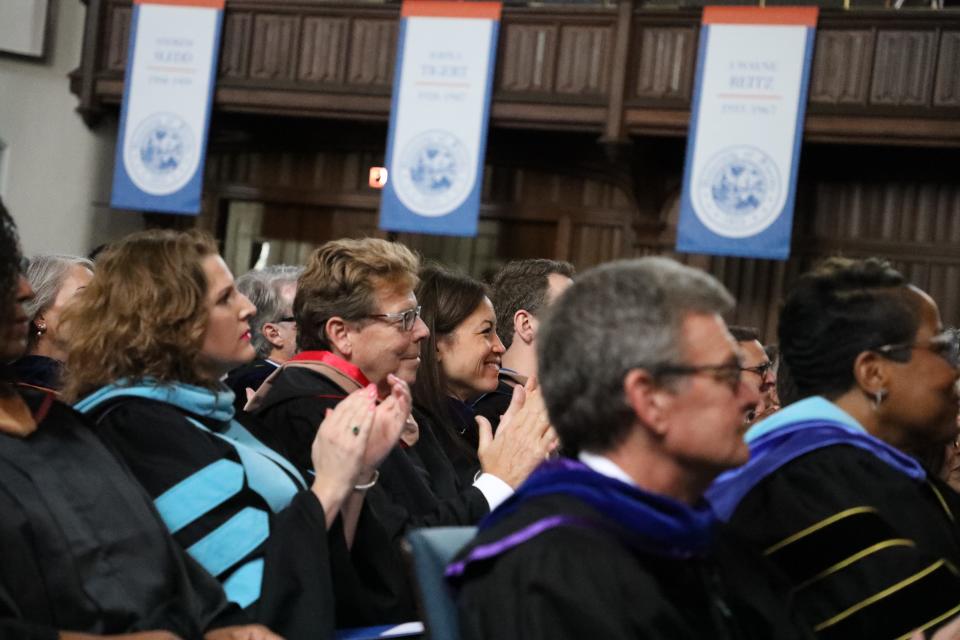Ben Sasse has been UF's president for nearly a year. Here's a look at his tenure so far:
The University of Florida’s 13th president was met with backlash, protests and skepticism when first brought on in February 2023.
After he's been on the job nearly a year, some members of the UF community are still unsure if he’s the right fit.
Among President Ben Sasse's notable plans for the university is funding dozens of initiatives. He also has expressed a strong desire to dive into Artificial Intelligence (AI) on campus.
Sasse’s presidency was announced in October 2022 by a 15-member search committee that chose him as sole finalist after months of combing through 700 other candidates. No other finalist would come forward unless chosen as sole finalist, Rahul Patel, a UF trustee and chair of the Presidential Search Committee, previously told The Sun.

During his inauguration speech on Nov. 3, Sasse said he seeks to encourage viewpoint diversity on campus, facilitating good faith agreements and conversations and rejecting extremism. He also pledged to defend tenure as a critical tool for UF, refine the core curriculum, and increase transparency and accountability at the university.
The beginning: US Sen. Ben Sasse positioned to become UF's next president
Sasse emphasized the importance of AI and technology at UF but made no mention of its potentially negative results.
“He doesn't go on to address the plans and methods of ensuring that no harm comes to creators, essentially, and other people that might be harmed by the use of AI,” UF junior Lyn Allen said. “It feels like this is very much of him just trying to say something that's big and like new.”
Allen spoke of concerns around the elimination of majors that Gov. Ron DeSantis may consider “woke,” such as anthropology, Black history and indigenous studies. They said Sasse is treating the position of UF president similar to a politician, with empty campaign promises to win over students.
“It seems that he’s basically just here to try and be the hands of Ron DeSantis,” Allen said. “He’s here to work on Ron DeSantis’ behalf… Especially since Ron DeSantis got him the job, he’s just going to do whatever Ron DeSantis tells him to do.”
Plans for the university
The university announced in October that 19 new projects related to research, technology, AI and student life would receive strategic funding from the state Legislature. Officials said the goal of the funding initiative is to create a better student experience and increase interdisciplinary scholarship at the university.
UF received $130 million in new funding from the state this year. Sasse established that more than half, for the first time, will be used for strategic purposes.
Sasse’s 10-year strategic plan was also announced recently in September. However, the administration did not release the entire plan, which UF said has been in the works since he took office in February.
The strategic plan references the “10x10x10” concept: 10 areas where UF could be considered Top 10 in the next 10 years. Areas for consideration include AI, agriculture, space, and engineering, followed by others such as education, innovation, health and sustainability.
“My initial thought was: Where are the things that are going to impact staff?” said Kestrel Ward, UF librarian. “There wasn’t anything that really seemed to be affecting staff. And so, you know, is he just pretending that we don’t exist, or is he not going to do anything to improve our working conditions and to advance the interests of the general staff?”
Finalization of the strategic plan and gaining its approval by the Board of Trustees is planned for fall 2024.
Initial protests: UF presidential finalist Ben Sasse confronted by protesters during his first campus visit
Ward, who organizes with the United Campus Workers UF Staff Union, said Sasse has not acknowledged the group or responded to its requests to meet with him. It also helped organize initial protests against Sasse and believes he was a politically motivated choice to control higher education in Florida.
Staff was given a 3% raise based on performance in October, which Ward said makes up less than half of the rise in the cost of living in Gainesville within the past year. Additionally, the group said the decision to use the money for staff raises or apply it elsewhere was left up to each college, meaning not everybody received a raise.
“Other colleges applied it very opaquely, like there was no clarity on why some people got it and why some people didn’t,” Ward said. “Everybody needs a raise because our cost of living has gone up so much, and they are giving us these little merit raises that do only help a few people, and even then, don’t help them enough to actually make up for the cost of living.”
Ward also said that even after the 3% raise, they can’t afford to live on what UF is paying them and may soon take a job elsewhere despite enjoying what they do at the library.
LGBTQ+ Issues, Community Uncertainty
Despite new technological initiatives and a strategic plan, some members of the UF community still aren’t certain that Sasse, who previously faced backlash for his conservative views and lack of experience with large institutions, was the best choice.
“He’s just been kind of ignoring LGBTQ people,” Ward said. “He’s not, like, setting out to persecute us, but he’s also not like paying any attention to our issues and concerns, either. He’s just kind of, like, pretending we don’t exist.”

Ward also said that Sasse’s involvement and appearance on campus are extremely limited compared to former president Kent Fuchs, who would frequently take his lunch to the Plaza of the Americas or just walk around UF.
Sasse and LGBTQ+: Gainesville's LGBTQ community speaks out on Ben Sasse as likely next UF president
Oscar Santiago Perez, student Senate president and member of the LGBTQ+ presidential advisory committee, said the same.
“Students haven’t gained much confidence, and during my confirmation hearing, I did tell him [Sasse] that he would have to essentially climb a hill of trust to be able to gain the trust of the student body, and I don’t think he’s done that,” he said. “He was absolutely absent during his first few months in office – he did not show up anywhere, he was practically in hiding – and then afterward, he started to make his appearances, but he started to make commentary about department cuts and about financial aid regarding Bright Futures.”
Sasse attended an LGBTQ+ presidential advisory committee meeting in May to discuss the advancement of protections and accessibility for LGBTQ+ students on campus. He seemed receptive to the conversation, and Santiago Perez thought it was productive, but he hasn’t heard from Sasse since, and no commitments have been made.
“He's not really putting himself out there,” he said. “It could be because he knows that he’s not popular, but, I mean, ultimately he does have to get out of his office and little bubble and get out there to experience the reality.”
There were concerns among students, faculty and staff about the transparency of the presidential search and Sasse being the only finalist. Senate Bill 520 allowed the university to conduct most of the search behind closed doors without following Florida’s open meetings and public records laws.
UF History Professor Paul Ortiz said he supported the UF Faculty Senate’s vote of no confidence around the presidential search, which he said in an email was “highly irregular, politicized, and done without the opportunity for adequate student and community input.”
Despite a rocky beginning, Ortiz said he hopes to see Sasse thrive in his role and play a part in ensuring the state of Florida doesn’t interfere with the academic freedom of students and faculty.
Sasse gained praise from UF’s Jewish community after writing a letter to the Jewish Gator Alums condemning the actions of the terrorist group Hamas and vowing to protect Jewish students while simultaneously protecting free speech.

From Senate to UF, hirings
With a background in politics, Sasse served as president of Midland University — a small private college with less than 2,000 students in Nebraska — from 2009 to 2014 and lacks experience with large institutions such as UF.
Concerns: Faculty members are perplexed on how Ben Sasse plans to lead the University of Florida
He served as U.S. Senator for Nebraska for eight years and was one of seven Republican senators who voted to convict former President Donald Trump during his second impeachment trial.
He has made several notable hires among his 10 leadership-level moves, which include hiring people who live out of state and firing Charlie Lane.
Sasse named his former Senate communications director, James Wegmann, as UF’S vice president for communications and his former Senate chief of staff, Raymond Sass, as UF’s vice president for innovation and partnerships.
He also created a new position to hire Penny Schwinn, former Tennessee commissioner of education, as UF’s vice president of PK-12 and pre-bachelor programs. She also lives out of state and works part time with no current plans to move to Florida.

“This isn't unusual for an enterprise of UF's scope and stature,” UF spokesperson Cynthia Roldan previously told The Sun in an email. “It’s 2023, and we're able to excel with big-cause, low-ego teams that are constantly working at an elite level using common technology that allows them to be effective from anywhere.”
Steve Orlando, associate vice president for communications, said Sasse continues to engage with UF’s 16 colleges during the current, ongoing strategic planning process.
“Since Day 1, Ben made it a priority to retain our best faculty and staff, recruit top-notch talent, build a dynamic student experience, and prepare UF to lead the future of higher education,” said Orlando in an email. “Earning the WSJ’s No. 1 public school ranking is great — it proves that UF is world-class — but we can’t sit still. We’re No. 1 because of a lot of hard work, and we’ve got to keep pushing the pedal to the metal. That’s what Ben was hired to do.”
The top ranking comes from the Wall Street Journal, which isn't a popularly referenced ranking list.
Since Sasse became president UF has dropped one spot on the U.S. News & World Report list, losing its status as a “Top 5” public university.
This article originally appeared on The Gainesville Sun: UF President Ben Sasse's progress so far
